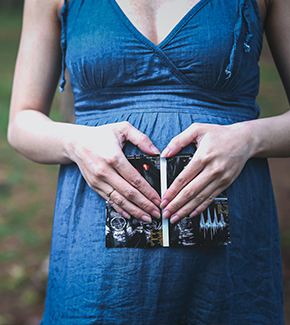You’re a natural at this! A guide to your second trimester

After getting used to the first signs of pregnancy and the changes that come with the first trimester, you deserve a bit of a rest. We’re not saying it’s easy, but many moms-to-be say the second trimester is their favourite — usually because their energy levels get a boost and they stop feeling nauseous regularly.
A big part of the second trimester is taking care of your body, paying attention to the changes you’re going through, and booking all your necessary exams and scans. Ready to see what’s waiting for you? Let’s go!
- More physical changes and feeling your baby’s movements: In your second trimester, you’re expected to gain 1 to 1.5kg per week. A small bump will start showing quickly, as your abdomen expands to give the baby more space to grow. Your breasts will usually get bigger, and you’ll notice that your blood vessels are dilating, in response to pregnancy hormones. You can also expect some dizziness as your blood pressure drops. During this time you’ll be able to feel your baby’s first movements, which is an exhilarating experience!
- Focus on your diet — and your cravings! During this trimester you’ll feel your appetite change. Make sure you drink plenty of water and include different sources of vitamins and minerals in your meals. Beans and lentils, leafy green vegetables, whole grains and nuts, fortified cereals, mushrooms, eggs, fatty fish, flaxseeds and chia seeds are excellent sources of proteins, calcium and folate (folic acid). More importantly: don’t ignore your cravings. A series of studies have linked pregnancy cravings with moms-to-be reacting to a lack of nutrients. So if you’re craving a big sandwich with ice cream and strawberries, your body might be telling you that you need some calcium. The research isn’t fully comprehensive yet, but in the meantime just embrace it!
- Blood tests and disease scanning: Following your first trimester check-ups, prepare yourself for more blood tests and medical consultations. Now it’s time to check your blood sugar and pressure, and thyroid function, check for anaemia, and infectious diseases, among others. One of the most important blood tests you’ll have during this trimester is on your blood group and antibodies. This exam tests the Rhesus (Rh) Factor, an inherited protein found on the surface of red blood cells. If your blood has the protein, you are Rhesus positive, and if it lacks the protein, you’re negative. If you and your baby have different Rhesus types, your body can produce antibodies against Rhesus, which could affect future pregnancies, or cause anaemia and jaundice in your child. While these complications have become less common, it’s essential to have a good prenatal plan and take all possible tests, to make sure you and your baby are healthy. You can learn more on the HSE website.
- Include extra exercise time in your routine: One downside of the second trimester is that you’ll probably feel some physical discomfort. Back and abdominal pain and leg cramps are the most common symptoms, all related to the gradual physical changes you’re experiencing. The best way to deal with this is to include some moderate exercise in your routine. If you already exercised before pregnancy, it’s safe and healthy to maintain your regular pace — as your bump starts to grow, you will slow down naturally. If you’re not a big fan of exercising, this is a great time to start! Go for short walks around your neighbourhood and try to be more active every day. Dancing, jogging and even taking some online yoga, aerobics and stretch classes can really enhance your wellbeing, reduce stress and boost your energy levels.
- Gender scans — hooraaay! From your 18th week onwards, you’ll be able to book your first gender scan. While some parents like to keep their baby’s gender a surprise until they’re born, it’s becoming increasingly common to book these scans as soon as possible. Knowing the baby’s gender will allow parents, relatives and friends time to organise gender reveal parties and start to plan the baby’s layette. Our Gender scans provide the mom-to-be with a 2D image of their baby and verifies the foetal heartbeat, showing its position and determining its gender. Our team of sonographers guarantee 95% of accuracy.
Feature Posts
- When Can You Have an Early Pregnancy Scan in Ireland? (6–10 Weeks Explained)
- Becoming a dad: How to support your partner all through pregnancy
- Getting ready to give birth
- You’re a natural at this! A guide to your second trimester
- I’m pregnant – what do I do now? A guide to your first trimester
- Supplements and vitamins during pregnancy
- Early signs of pregnancy
- Differences between types of pregnancy scans